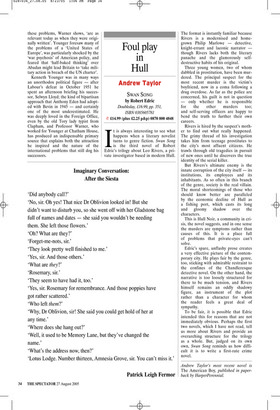Foul play in Hull
Andrew Taylor
SWAN SONG by Robert Edric Doubleday, £16.99, pp. 351, ISBN 0385605781 ✆ £14.99 (plus £2.25 p&p) 0870 800 4848 It is always interesting to see what happens when a literary novelist turns to genre fiction. Swan Song is the third novel of Robert Edric’s trilogy about Leo Rivers, a private investigator based in modern Hull. The format is instantly familiar because Rivers is a modernised and homegrown Philip Marlowe — detective, knight-errant and laconic narrator though Rivers lacks both the literary panache and the glamorously selfdestructive habits of his original.
Three young women, two of whom dabbled in prostitution, have been murdered. The principal suspect for the most recent murder is the victim’s boyfriend, now in a coma following a drug overdose. As far as the police are concerned, his guilt is not in question — only whether he is responsible for the other murders too; and self-serving officers are happy to bend the truth to further their own careers.
Rivers is hired by the suspect’s mother to find out what really happened. The grimy thread of his investigation takes him from teenage prostitutes to the city’s most affuent citizens. He trawls through old tragedies in pursuit of new ones until he discovers the true identity of the serial killer.
But Rivers’s ultimate enemy is the innate corruption of the city itself — its institutions, its employees and its inhabitants. As so often in this branch of the genre, society is the real villain. The moral shortcomings of those who should know better are paralleled by the economic decline of Hull as a fishing port, which casts its long and gloomy shadow over the characters.
This is Hull Noir, a community in crisis, the novel suggests, and in one sense the murders are symptoms rather than causes of this. It is a place full of problems that private-eyes can’t solve.
Edric’s spare, unflashy prose creates a very effective picture of the contemporary city. He plays fair by the genre, too, sticking with admirable restraint to the confines of the Chandleresque detective novel. On the other hand, the narrative is too loosely structured for there to be much tension, and Rivers himself remains an oddly shadowy figure, an instrument of the plot rather than a character for whom the reader feels a great deal of sympathy.
To be fair, it is possible that Edric intended this for reasons that are not immediately obvious. Perhaps the first two novels, which I have not read, tell us more about Rivers and provide an overarching structure for the trilogy as a whole. But, judged on its own own, Swan Song reminds us how difficult it is to write a first-rate crime novel.
Andrew Taylor’s most recent novel is The American Boy, published in paperback by HarperPerennial.











































 Previous page
Previous page